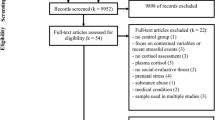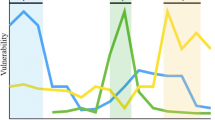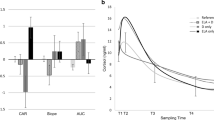Abstract
Rationale
We examined the hypothesis that stress-related blunting of cortisol in smokers is particularly pronounced in those with a history of severe life adversity.
Objectives
The two aims of this study were first to examine hormonal, craving, and withdrawal symptoms during ad libitum smoking and after the first 24 h of abstinence in smokers who experienced high or low levels of adversity. Second, we sought to examine the relationship between adversity and hypothalamic-pituitary-adrenal (HPA) hormones to predict relapse during the first month of a smoking cessation attempt.
Methods
Hormonal and self-report measures were collected from 103 smokers (49 women) during ad libitum smoking and after the first 24 h of abstinence. HPA hormones were measured during baseline rest and in response to acute stress in both conditions. All smokers were interested in smoking cessation, and we prospectively used stress response measures to predict relapse during the first 4 weeks of the smoking cessation attempt.
Results
The results showed that high adversity was associated with higher distress and smoking withdrawal symptoms. High level of early life adversity was associated with elevated HPA activity, which was found in both salivary and plasma cortisol. Enhanced adrenocorticotropic hormone (ACTH) stress response was evident in high-adversity but not in low-adversity relapsers.
Conclusions
This study demonstrated that early life adversity is associated with stress-related HPA responses. The study also demonstrated that, among smokers who experienced a high level of life adversity, heightened ACTH and cortisol responses were linked with increased risk for smoking relapse.



Similar content being viewed by others
References
al’Absi M (2006) Hypothalamic-pituitary-adrenocortical responses to psychological stress and risk for smoking relapse. Int J Psychophysiol 59:218–227
al’Absi M, Amunrud T, Wittmers LE (2002) Psychophysiological effects of nicotine abstinence and behavioral challenges in habitual smokers. Pharmacol Biochem Behav 72:707–716
al’Absi M, Wittmers LE, Erickson J, Hatsukami D, Crouse B (2003) Attenuated adrenocortical and blood pressure responses to psychological stress in ad libitum and abstinent smokers. Pharmacol Biochem Behav 74:401–410
al’Absi M, Hatsukami D, Davis GL, Wittmers LE (2004) Prospective examination of effects of smoking abstinence on cortisol and withdrawal symptoms as predictors of early smoking relapse. Drug Alcohol Depend 73:267–278
al’Absi M, Hatsukami D, Davis GL (2005) Attenuated adrenocorticotropic responses to psychological stress are associated with early smoking relapse. Psychopharmacology 181:107–117
al’Absi M, Carr SB, Bongard S (2007) Anger and psychobiological changes during smoking abstinence and in response to acute stress: prediction of smoking relapse. Int J Psychophysiol 66:109–115
al’Absi M, Nakajima M, Allen S, Lemieux A, Hatsukami D (2015) Sex differences in hormonal responses to stress and smoking relapse: a prospective examination. Nicotine Tob Res 17:382–389
Anda RF, Croft JB, Felitti VJ, Nordenberg D, Giles WH, Williamson DF, Giovino GA (1999) Adverse childhood experiences and smoking during adolescence and adulthood. JAMA 282:1652–1658
Bellis MA, Hughes K, Leckenby N, Perkins C, Lowey H (2014a) National household survey of adverse childhood experiences and their relationship with resilience to health-harming behaviors in England. BMC Med 12:72
Bellis MA, Lowey H, Leckenby N, Hughes K, Harrison D (2014b) Adverse childhood experiences: retrospective study to determine their impact on adult health behaviours and health outcomes in a UK population. J Public Health (Oxf) 36:81–91
Bohadana A, Nilsson F, Rasmussen T, Martinet Y (2003) Gender differences in quit rates following smoking cessation with combination nicotine therapy: influence of baseline smoking behavior. Nicotine Tob Res 5:111–116
Center for Substance Abuse Treatment (2014) Trauma informed care in behavioral health services. Substance Abuse and Mental Health Services Administration, Rockville
Cepeda-Benito A, Reynoso JT, Erath S (2004) Meta-analysis of the efficacy of nicotine replacement therapy for smoking cessation: differences between men and women. J Consult Clin Psychol 72:712–722
Cox LS, Tiffany ST, Christen AG (2001) Evaluation of the brief questionnaire of smoking urges (QSU-brief) in laboratory and clinical settings. Nicotine Tob Res 3:7–16
Danese A, McEwen BS (2012) Adverse childhood experiences, allostasis, allostatic load, and age-related disease. Physiol Behav 106:29–39
Danese A, Tan M (2014) Childhood maltreatment and obesity: systematic review and meta-analysis. Mol Psychiatry 19:544–554
Dong M, Giles WH, Felitti VJ, Dube SR, Williams JE, Chapman DP, Anda RF (2004) Insights into causal pathways for ischemic heart disease: adverse childhood experiences study. Circulation 110:1761–1766
Edwards VJ, Anda RF, Gu D, Dube SR, Felitti VJ (2007) Adverse childhood experiences and smoking persistence in adults with smoking-related symptoms and illness. Perm J 11:5–13
Elliott JC, Stohl M, Wall MM, Keyes KM, Goodwin RD, Skodol AE, Krueger RF, Grant BF, Hasin DS (2014) The risk for persistent adult alcohol and nicotine dependence: the role of childhood maltreatment. Addiction 109:842–850
Farris SG, Zvolensky MJ (2016) An experimental test of the effect of acute anxious arousal and anxiety sensitivity on negative reinforcement smoking. J Psychopharmacol 30:641–653
Felitti VJ, Anda RF, Nordenberg D, Williamson DF, Spitz AM, Edwards V, Koss MP, Marks JS (1998) Relationship of childhood abuse and household dysfunction to many of the leading causes of death in adults. The adverse childhood experiences (ACE) study. Am J Prev Med 14:245–258
Ford ES, Anda RF, Edwards VJ, Perry GS, Zhao G, Li C, Croft JB (2011) Adverse childhood experiences and smoking status in five states. Prev Med 53:188–193
Fuller-Thomson E, Filippelli J, Lue-Crisostomo CA (2013) Gender-specific association between childhood adversities and smoking in adulthood: findings from a population-based study. Public Health 127:449–460
Heatherton TF, Kozlowski LT, Frecker RC, Fagerstrom KO (1991) The Fagerstrom test for nicotine dependence: a revision of the Fagerstrom tolerance questionnaire. Br J Addict 86:1119–1127
Heim C, Newport DJ, Bonsall R, Miller AH, Nemeroff CB (2001) Altered pituitary-adrenal axis responses to provocative challenge tests in adult survivors of childhood abuse. Am J Psychiatry 158:575–581
Huang H, Yan P, Shan Z, Chen S, Li M, Luo C, Gao H, Hao L, Liu L (2015) Adverse childhood experiences and risk of type 2 diabetes: a systematic review and meta-analysis. Metabolism 64:1408–1418
Hughes JR, Hatsukami D (1986) Signs and symptoms of tobacco withdrawal. Arch Gen Psychiatry 43:289–294
Hughes JR, Keely JP, Niaura RS, Ossip-Klein DJ, Richmond RL, Swan GE (2003) Measures of abstinence in clinical trials: issues and recommendations. Nicotine Tob Res 5:13–25
Jarvis MJ, Cohen JE, Delnevo CD, Giovino GA (2013) Dispelling myths about gender differences in smoking cessation: population data from the USA, Canada and Britain. Tob Control 22:356–360
Kalmakis KA, Chandler GE (2015) Health consequences of adverse childhood experiences: a systematic review. J Am Assoc Nurse Pract 27:457–465
Kassel JD, Veilleux JC, Wardle MC, Yates MC, Greenstein JE, Evatt DP, Roesch LL (2007) Negative affect and addiction. In: al’Absi M (ed) Stress and addiction. Academic press, London, pp 171–190
Killen JD, Fortmann SP, Kraemer HC, Varady AN, Davis L, Newman B (1996) Interactive effects of depression symptoms, nicotine dependence, and weight change on late smoking relapse. J Consult Clin Psychol 64:1060–1067
Kim SW, Kang HJ, Kim SY, Kim JM, Yoon JS, Jung SW, Lee MS, Yim HW, Jun TY (2013) Impact of childhood adversity on the course and suicidality of depressive disorders: the CRESCEND study. Depress Anxiety 30:965–974
Kosten TA, Kehoe P (2007) Early life stress and vulnerability to addiction. In: al’Absi M (ed) Stress and addiction: biological and psychological mechanisms. Academic press/Elsevier, London, pp 105–126
Kosten TA, Miserendino MJ, Kehoe P (2000) Enhanced acquisition of cocaine self-administration in adult rats with neonatal isolation stress experience. Brain Res 875:44–50
Kosten TA, Miserendino MJ, Bombace JC, Lee HJ, Kim JJ (2005) Sex-selective effects of neonatal isolation on fear conditioning and foot shock sensitivity. Behav Brain Res 157:235–244
Kroenke K, Spitzer RL, Williams JB (2001) The PHQ-9: validity of a brief depression severity measure. J Gen Intern Med 16:606–613
Lemieux A, Olson L, Nakajima M, Schulberg L, al’Absi M (2016) Life adversity is associated with smoking relapse after a quit attempt. Addict Behav 60:71–77
Leyton M, Vezina P (2014) Dopamine ups and downs in vulnerability to addictions: a neurodevelopmental model. Trends Pharmacol Sci 35:268–276
McKee SA, Sinha R, Weinberger AH, Sofuoglu M, Harrison EL, Lavery M, Wanzer J (2011) Stress decreases the ability to resist smoking and potentiates smoking intensity and reward. J Psychopharmacol 25:490–502
Muscatello MR, Scimeca G, Lorusso S, Battaglia F, Pandolfo G, Zoccali RA, Bruno A (2017) Anger, smoking behavior, and the mediator effects of gender: an investigation of heavy and moderate smokers. Subst Use Misuse 52:587–593
Najavits LM, Gastfriend DR, Barber JP, Reif S, Muenz LR, Blaine J, Frank A, Crits-Christoph P, Thase M, Weiss RD (1998) Cocaine dependence with and without PTSD among subjects in the National Institute on Drug Abuse Collaborative Cocaine Treatment Study. Am J Psychiatry 155:214–219
Nakajima M, al’Absi M (2012) Predictors of risk for smoking relapse in men and women: a prospective examination. Psychol Addict Behav 26:633–637
Nakajima M, al'Absi M (2013) Patterns of change in affect and adrenocortical activity over an extended period of smoking abstinence. Psychol Addict Behav 27:1189–95
Potretzke S, Nakajima M, Cragin T, al’Absi M (2014) Changes in circulating leptin levels during acute stress and associations with craving in abstinent smokers: a preliminary investigation. Psychoneuroendocrinology 47:232–240
Shaw D, al’Absi M (2010) Blunted opiate modulation of prolactin response in smoking men and women. Pharmacol Biochem Behav 95:1–5
Sinha R (2008) Chronic stress, drug use, and vulnerability to addiction. Ann N Y Acad Sci 1141:105–130
Spielberger CD, Gorsuch RL, Lushene R, Vagg PR, Jacobs GA (1983) Manual for the state-trait anxiety inventory. Consulting Psychologists Press, Palo Alto
Sriram K, Rodriguez-Fernandez M, Doyle FJ 3rd (2012) Modeling cortisol dynamics in the neuro-endocrine axis distinguishes normal, depression, and post-traumatic stress disorder (PTSD) in humans. PLoS Comput Biol 8:e1002379
Strine TW, Edwards VJ, Dube SR, Wagenfeld M, Dhingra S, Prehn AW, Rasmussen S, McKnight-Eily L, Croft JB (2012) The mediating sex-specific effect of psychological distress on the relationship between adverse childhood experiences and current smoking among adults. Subst Abuse Treat Prev Policy 7:30
Su S, Jimenez MP, Roberts CT, Loucks EB (2015) The role of adverse childhood experiences in cardiovascular disease risk: a review with emphasis on plausible mechanisms. Curr Cardiol Rep 17:88
Tiffany ST, Drobes DJ (1991) The development and initial validation of a questionnaire on smoking urges. Br J Addict 86:1467–1476
Toll BA, O’Malley SS, McKee SA, Salovey P, Krishnan-Sarin S (2007) Confirmatory factor analysis of the Minnesota nicotine withdrawal scale. Psychol Addict Behav 21:216–225
Topitzes J, Mersky JP, Reynolds AJ (2010) Child maltreatment and adult cigarette smoking: a long-term developmental model. J Pediatr Psychol 35:484–498
Torchalla I, Okoli CT, Bottorff JL, Qu A, Poole N, Greaves L (2012) Smoking cessation programs targeted to women: a systematic review. Women Health 52:32–54
van Loon AJ, Tijhuis M, Surtees PG, Ormel J (2005) Determinants of smoking status: cross-sectional data on smoking initiation and cessation. Eur J Pub Health 15:256–261
Walsh EG, Cawthon SW (2014) The mediating role of depressive symptoms in the relationship between adverse childhood experiences and smoking. Addict Behav 39:1471–1476
Wilsnack SC, Vogeltanz ND, Klassen AD, Harris TR (1997) Childhood sexual abuse and women’s substance abuse: national survey findings. J Stud Alcohol 58:264–271
Winfield I, George LK, Swartz M, Blazer DG (1990) Sexual assault and psychiatric disorders among a community sample of women. Am J Psychiatry 147:335–341
Xie P, Kranzler HR, Zhang H, Oslin D, Anton RF, Farrer LA, Gelernter J (2012) Childhood adversity increases risk for nicotine dependence and interacts with alpha5 nicotinic acetylcholine receptor genotype specifically in males. Neuropsychopharmacology 37:669–676
Young MS, Harford KL, Kinder B, Savell JK (2007) The relationship between childhood sexual abuse and adult mental health among undergraduates: victim gender doesn’t matter. J Interpers Violence 22:1315–1331
Zhang XY, Sanchez H, Kehoe P, Kosten TA (2005) Neonatal isolation enhances maintenance but not reinstatement of cocaine self-administration in adult male rats. Psychopharmacology 177:391–399
Acknowledgements
We would like to thank the following individuals for their help with collecting (Barbara Gay, Elizabeth Ford, Dayna Schleppenbach, Soni Rraklli, Angie Forsberg) and managing (Motohiro Nakajima and Jie Gooder) the data for this study. Nikki Neumann, Christopher Schweiger, and Dan Vuicich helped with the conducting the assays. We also would like to thank Dr. Susan Raatz for providing nutritional guidance and Briana DeAngelis for her editorial help with this manuscript.
Funding
This research was supported in part by grants to the first author from the National Institute of Health (R01DA016351 and R01DA027232).
Author information
Authors and Affiliations
Corresponding author
Ethics declarations
Conflict of interest
The authors declare that they have no competing interests.
Electronic supplementary material
ESM 1
(DOCX 61.8 kb)
Rights and permissions
About this article
Cite this article
al’Absi, M., Lemieux, A., Westra, R. et al. Early life adversity influences stress response association with smoking relapse. Psychopharmacology 234, 3375–3384 (2017). https://doi.org/10.1007/s00213-017-4724-4
Received:
Accepted:
Published:
Issue Date:
DOI: https://doi.org/10.1007/s00213-017-4724-4




